Coronavirus Australia live news: States wary of worst day in months as Victorian cases soar to 75 in one day
As Victorian cases soar to 75 overnight — the worst day since March — wary other states rethink border openings, tighten quarantine on back of spike.
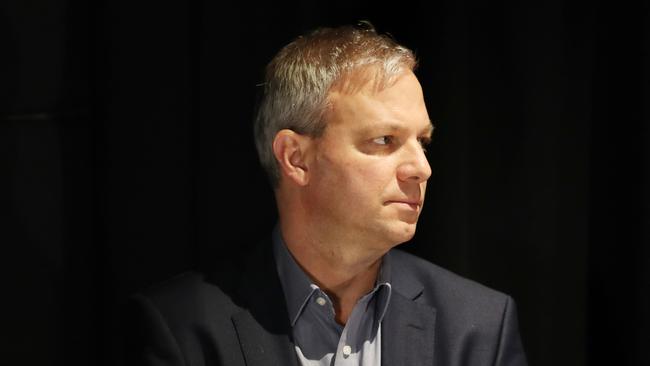
- States running scared of Victorian virus spike
- Victoria all but concedes ‘second wave’
- Melbourne numbers soar to 75
- ABF worker in Melbourne tests positive
- Global cases pass 10 million
- Stay-at-home orders may be imposed
- How Victoria got it wrong on COVID-19
Welcome to live coverage of the continuing coronavirus crisis. Victoria’s ‘second wave’ of coronavirus infection has states running scared, with many reconsidering border re-openings. Victoria has recorded its worst rise yet, with 75 new cases recorded on Monday. It’s CHO concedes it’s a second peak or second wave of infection. Premier Daniel Andrews may impose stay-at-home orders on virus hot spots in the wake of 90 new cases being recorded in Melbourne over the weekend.
AFP 8.05pm: Thai nightlife opens to some foreigners
Thailand’s nightlife will restart with some restrictions this week, the kingdom announced on Monday, part of a return to normalcy as it prepares to welcome business travellers and medical tourists after a ban on foreign entry.
Thailand has 3169 cases and 58 deaths from the coronavirus — a low toll considering the kingdom in mid-January became was the first country outside China to register a case.
But the tourism-reliant economy has been hit hard by the border closures, while a halt to its infamous nightlife has left the kingdom’s informal workers — in bars, massage parlours, and karaoke lounges — adrift.
Premier Prayut Chan-O-Cha said the “most at-risk businesses” will be allowed to reopen from Wednesday, as there has been no local transmission of the virus for more than a month.
“The most important thing we care about are the people who have no income for their families,” he said. “Secondly we are confident that our health system is ready to handle (the situation).”
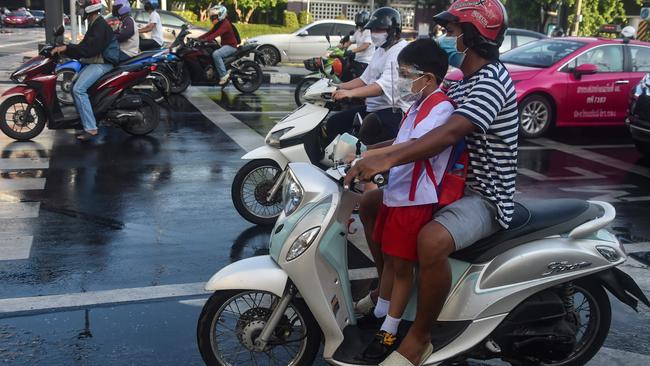
From Wednesday, bars, clubs and karaoke lounges can reopen, though they must adhere to a midnight closing time and have social distancing measures, said Taweesin Visanuyothin, spokesman for the Centre for COVDI-19 Situation Administration.
Massage parlours and teahouses — which sometimes act as fronts for brothels — will also have to register customers using the government’s tracking app.
“Staff must be tested for COVID-19 from time to time and there should be no sex trade,” said Taweesin.
Thailand will also relax entry restrictions on foreigners with work permits or with Thai spouses and families, and people who wish to enter the kingdom for medical services.
Business travellers from Japan, South Korea, Singapore and China, including Hong Kong, will also be allowed in, provided they pay for quarantine in hotels.
Tourists will still be barred, although authorities floated the idea of “travel bubbles” earlier this month.
READ MORE: Rare chance to reboot manufacturing, says Liveris
Matthew Denholm 7.30pm: Breath test for virus ‘to boost safety of travel’
Australian scientists expect to develop a quick breath test for coronavirus within 12 to 15 months, in a potential boost to the safety of travel and public gatherings.
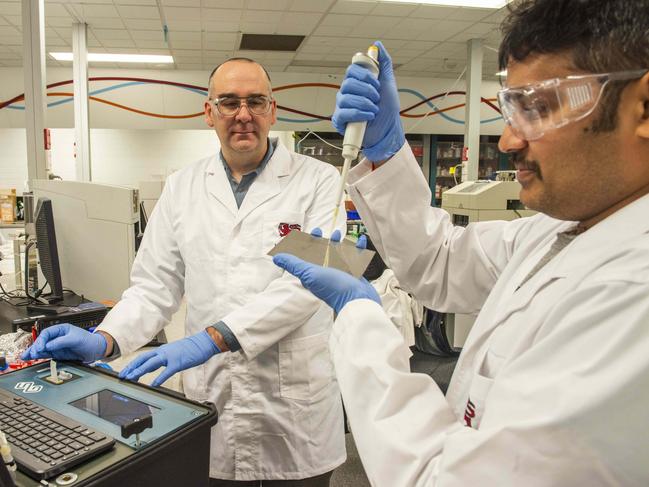
A team that developed and commercialised a rapid test to detect traces of homemade explosives is attempting to apply the same technology to viruses, including COVID-19.
If successful, an on-the-spot test for coronavirus, taking only a few minutes, could improve the safety of travel and public gatherings, particularly if efforts to create a vaccine fail or are long delayed.
Michael Breadmore, director of the Australian Centre for Research on Separation Science, told The Australian he was confident his research team would develop a quick test to identify COVID-19 on surfaces and breath.
“That would give us a real quick non-invasive test, something like a breath test by a roadside police person, to see whether you are infectious for COVID-19,” the Hobart-based researcher said.
Read the full story here
Matthew Westwood 7pm: ‘Curtain closes unless theatres reopen’
Sydney Theatre Company has posted a loss on operations of $7.8m for 2019, as the board led by former Commonwealth Bank chief Ian Narev issues a warning about the company’s future viability after the unexpected interval brought on by coronavirus.

Last year’s losses were largely due to depreciation, asset writedowns and planned disruption while the Wharf Theatre on Sydney Harbour is closed for a major upgrade.
But the impact of COVID-19 on the nation’s largest subsidised theatre company has led the STC board in its annual report to flag “material uncertainty” about its ability to continue.
Read the full story here
Kellie Southan 6.20pm: Map of active confirmed cases in Victoria
The most rapid growth in Victoria’s COVID-19 cases is in Melbourne’s northern and western suburbs
AAP 5.40pm: Storm could spend months in Queensland
Melbourne Storm’s timely escape to Queensland’s Sunshine Coast has helped the NRL avoid fixturing chaos enveloping the AFL but they may face months away from home.
The decision to relocate the Storm came ahead of Monday’s Queensland government crackdown on sporting teams from Melbourne, where the coronavirus spike has sounded alarm bells.
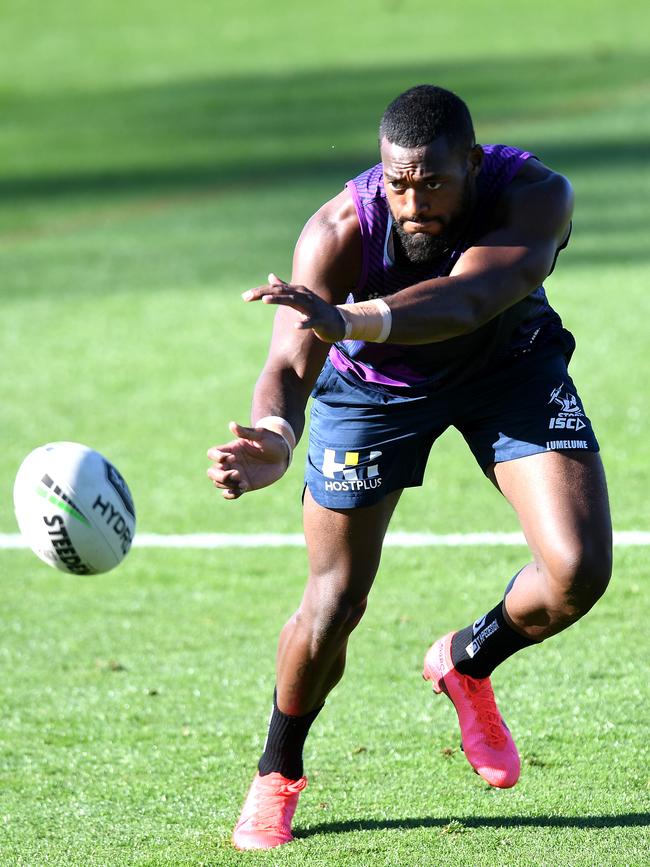
It means they are free to “host” the Sydney Roosters at Brisbane’s Suncorp Stadium on Thursday night.
But the Storm squad will likely need to settle in for a long stay in their new base at the Twin Waters resort.
Veteran forward Dale Finucane revealed the players held a meeting with NRL boss Andrew Abdo and biosecurity expert David Heslop on Sunday night and were told there was no end date for their stay in Queensland.
“Given that the numbers are increasing in Victoria it’s not looking like (we’ll be home) any time soon,” Finucane said on Monday.
“They want a period of 28 days once the virus has slowed. So if today, for whatever reason, the virus slowed, we’d be looking at 28 days.
“Obviously that’s probably not happening any time soon given that the rates are continuing to increase.”
While Finucane’s wife and baby son are spending time with family in NSW before heading to Queensland, about 20 partners and 30 children have already arrived — although they cannot leave the confines of the Storm “bubble” within the complex for the next fortnight.
They can access a beach, while those within the complex can still enjoy a round of golf on the adjoining course.
READ MORE: AFL season upended by Queensland
Rachel Baxendale 5.30pm: Victoria quarantines 2500 close contacts
Victoria has quarantined more than 2500 close contacts of confirmed coronavirus cases, Chief Health Officer Brett Sutton says.
The state has 288 known active cases of COVID-19, Professor Sutton confirmed on Monday.
“We’re at the limits of managing that number,” he said of the 2500.“It’s a very large number, but they are all in quarantine, as are all close contacts.
“They are all being followed up on a daily basis, but this speaks to the challenge of big numbers every day.”

Health Minister Jenny Mikakos said Victoria’s contact tracing unit had last week been increased from 1000 staff members to 1350.
“We’re (also) very grateful to our interstate counterparts for their offers of assistance,” Ms Mikakos said. “I think to date we’ve been utilising approximately 50 people from New South Wales, and WA when we’ve got a more up-to-date figure we’re happy to provide that also.
READ MORE: Get a grip, America
Rachel Baxendale 5.20pm: Vic health chief blames community transmission
Victoria’s Chief Health Officer says other states have escaped a second wave of COVID-19 because they have never dealt with community transmission.
Asked why Victoria was experiencing a second wave while all other states appear to have successfully suppressed or eradicated the coronavirus, Brett Sutton said on Monday: “Jurisdictions that never had community transmission, or had very, very little community transmission that was snuffed out during the significant restrictions across Australia, can open up now without a concern about it, and so they’ve really got local elimination that allows them to do the easing of restrictions without a concern about cases taking off.
Asked why NSW had less community transmission than Victoria despite a higher peak in case numbers, Professor Sutton said “New South Wales have been lucky in some respects”.
“I’ve flagged that it might be the colder weather in Victoria that’s allowed persistence on surfaces, persistence in the air.
“That’s been noted internationally recently, that the virus simply survives longer in cold and humid environments, and so that might have played a role in Victoria but whatever the case is, we can’t lament the fact that we’ve got it. We’ve got it and we need to respond.”
READ MORE: Coronavirus revives interest in suburban life
Rachel Baxendale 4.50pm: Worst spikes hit Melbourne’s north and west
The most rapid growth in Victoria’s COVID-19 cases is in Melbourne’s northern and western suburbs, but the pandemic is by no means contained to these areas, local government area data shows.
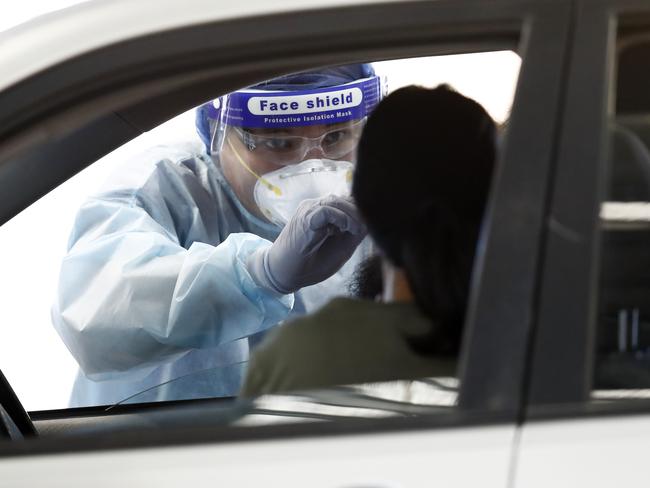
The worst-hit LGA of Hume, in Melbourne’s outer north, now has 54 active cases, including 21 new cases on Monday.
The second-worst hotspot is Brimbank, in the outer west, with 32 active cases, including three new cases.
Moonee Valley, in Melbourne’s northwest, has nine new cases as of Monday, with a total of 29 active cases.
However, new cases have appeared away from the northern and western suburbs, including three new cases each in Kingston, in the southeast, and Wyndham, in the southwest.
Stonnington and Port Phillip, in the inner southeast and south, respectively, recorded two new cases each on Monday.
A total of 18 LGAs in Melbourne have at least four active cases.
Victoria now has 288 active cases, up from 125 this time last week.
Active confirmed cases of COVID-19 by LGA as of Monday, with change since Sunday in brackets:
Hume (outer north): 54 (+21)
Brimbank (outer west): 32 (+3)
Moonee Valley (northwest): 29 (+9)
Moreland (north): 26 (+5)
Casey (outer southeast): 16 (+1)
Whittlesea (outer north): 16
Melton (outer northwest): 12 (+5)
City of Melbourne: 11
Maribyrnong (inner west): 9 (+1)
Yarra (inner northeast): 9 (+1)
Darebin (north): 8 (+2)
Kingston (southeast) 7 (+3)
Knox (outer east): 6
Wyndham (outer southwest): 8 (+3)
Glen Eira (southeast): 5 (+1)
Greater Dandenong (outer southeast): 5
Stonnington (inner southeast): 4 (+2)
Port Phillip (inner south): 4 (+2)
Mitchell (central regional Vic, north of Melb): 2
Hobsons Bay (inner southwest): 2
Banyule (northeast): 1 (+1)
Bayside (southeast) 1 (+1)
Greater Bendigo (central regional Vic): 1
Greater Geelong (southwest regional Vic): 1
Frankston (outer southeast): 1
Yarra Ranges (outer northeast): 1
Swan Hill (northwest regional Vic): 1
Latrobe (Gippsland, eastern regional Vic): 1
Nillumbik (outer northeast): 1
Cardinia (outer southeast): 1 (-4)
Interstate: 2 (-1)
Unknown: 11 (+1)
TOTAL: 288 (+57)
Rachel Baxendale 4.20pm: Victoria ‘not there yet’ on lockdowns: Sutton
Victoria’s Chief Health Officer Brett Sutton says authorities have not yet arrived at a point where they could make a decision about reimposing more severe social distancing measures or locking down suburbs, despite 13 days of double digit new case numbers and the highest daily number of new cases since March on Monday.
“Clearly big numbers today are absolutely concerning … but we know what will turn this around, and it’s people stepping forward for testing, but also isolating when they’ve got symptoms,” Professor Sutton said.
“Whether or not it needs a legal direction is a conversation to be had over the next couple of days.
“We’re not there yet, but we do know that the solution is there already, which is people not having unnecessary contacts, across multiple households, across multiple settings. That will control transmission.”
Asked whether it was clear merely telling people not to mingle was failing, Professor Sutton said more data was needed from the state’s testing blitz before any decision could be made.
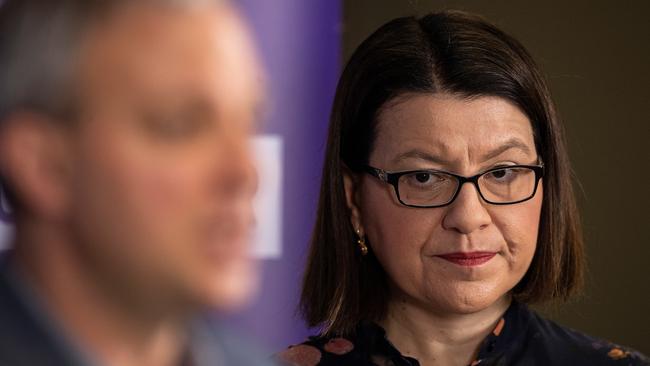
Asked whether 75 new cases on Monday wasn’t sufficiently bad for authorities to impose lockdowns, Professor Sutton said: “Well we are getting ahead of it in terms of a really intensive engagement and testing program, so 15-20,000 tests a day is getting ahead of it, because we’re identifying almost everything that’s out there.”
He agreed imposing lockdowns would be a more significant step.
“But it’s got to be proportionate. We know what the consequences are of a lockdown, in terms of fatigue of people’s behaviours,” Professor Sutton said.
“We don’t want to drive people out of suburban areas into new, unaffected areas, so there’s a balancing act in terms of making the call on a lockdown.
“We know that for a lot of our settings, restaurants and other places that have really taken up the COVIDSafe code, if you like, the risk of transmission in those settings is well-managed, and so it may not look the same in terms of shutting down a lot of those settings, because that’s not where transmissions occurring.
Professor Sutton said Victoria’s COVID-19 caseload would get worse before it got better.
He said many tests taken over the past few days had already been processed, but more results were coming through and more tests were being conducted.
“I expect that there’ll be at least as many positive cases as we’ve had over the last 24 hours,” he said.
READ MORE: Swimwear brand Seafolly calls in administrators
Debbie Schipp 3.30pm: States running scared of Victoria spike
Victoria’s ‘second wave’ of coronavirus infection — which jumped 75 cases overnight — has states running scared, with many reconsidering border re-openings.
Others are clamping down on football team quarantine, and many are wary of welcoming travellers from the south.
South Australia Premier Steven Marshall remains “very concerned” about the situation in Victoria, and will not open the SA border unless it’s “safe to do so”.
Announcing further easing of social restrictions today — which included doubling the number of patrons venues were allowed — Mr Marshall said SA was “bouncing back”.
But he said the planned reopening of the state’s borders on July 20 was now “under a cloud” due to a resurgence of coronavirus infections across Melbourne.
“We remain very, very concerned about what is happening in Victoria … we’ll continue to look very closely at those numbers,” Mr Marshall said at a press conference earlier today.
“We will not be opening our borders to Victoria if it is not safe to do so.”
Queensland — which has resisted continual appeals to reopen its borders — moved rapidly in response to news of Melbourne’s worst case numbers since March.
As Victorian Chief Health Officer Brett Sutton all but conceded the state was grappling with a second wave of infections, his Queensland counterpart introduced strict new quarantine rules for Queensland football teams that come into contact with Melbourne-based teams.
“The new measures specifically impact all Queensland-based teams, regardless of the code, and their interactions with Victorian-based teams,” Dr Jeanette Young said.
“These new measures do not prevent Victorian AFL teams travelling to QLD for existing matches. The new arrangements do however place extra restrictions on Queensland-based teams who play teams who have been in hot spots.”

It’s thrown AFL scheduling into turmoil.
Queensland Premier Annastacia Palaszczuk is due to announce on Tuesday whether the state’s border will reopen on July 10 as planned, based on health advice from Dr Young.
The Australian Medical Association says Queensland would be justified in keeping its border closed for another week, if not two, because of a second COVID-19 wave sweeping Victoria.
NSW Premier Gladys Berejiklian has advised NSW residents to stay away from Melbourne, and fans attending football games will have to show their drivers licence to prove they’re not from Victoria in order to enter.
NSW Health Minister Brad Hazzard said he had spoken with both the AFL and NRL and confirmed neither code would be allowing Victorian fans into the stands.
In WA, where the borders remain closed, premier Mark McGowan says rising case numbers in Victoria justified his government’s hardline stance.
Plans to reopen WA’s interstate borders on August 8 have been shelved amid a fresh outbreak of cases in several Melbourne hot spots, AAP reports.
“What is going in Victoria is very disturbing. That’s why we’ve got our border arrangements in place to protect our citizens, we’ve been vindicated in relation to the border with the community spread of the virus in Victoria,” he said.
Victoria must reduce its coronavirus community transmission to virtually zero before Western Australia reopens its borders, the WA’s chief health officer says.
READ MORE: ‘Sorry’ Sweden gets a lesson in isolation
Paul Garvey 3.20pm: WA sticks with AFL hub plan despite Vic spike
Western Australian premier Mark McGowan says the state will not change its plans for an AFL hub in the state, despite the growing outbreak of coronavirus in Victoria prompting Queensland to toughen its border restrictions.
Collingwood and Geelong are scheduled to arrive in WA in just over a fortnight, and will play each other while serving out the two-week quarantine currently mandatory for anyone entering the state. They will then play the Perth-based AFL teams after their isolation is complete.
The AFL was forced to re-jig its upcoming round of fixtures on Monday after Queensland moved to tighten rules on teams entering the state from Victoria, including abandoning a scheduled match on the Gold Coast between Richmond and West Coast.
Mr McGowan on Monday said that while the rising case numbers in Victoria justified his government’s hardline stance on the state’s border, he believed the AFL hub plans were still appropriate.
“The hub for the AFL teams is a secure quarantine arrangement. If Collingwood and Geelong come here, it will be a secure quarantine arrangement whereby they do not mix with local people.”
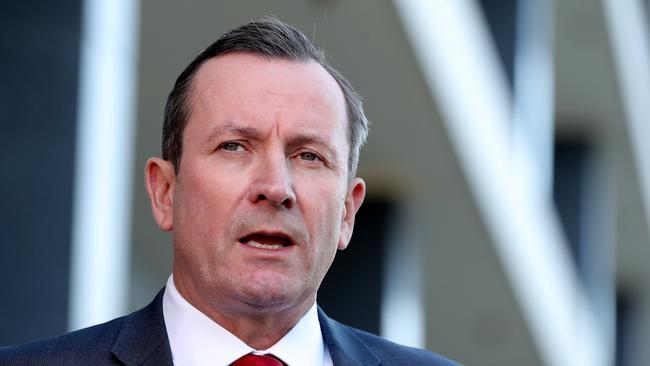
Players from the visiting teams would be regularly tested for the virus and would be subject to the strictest quarantine standards.
He also reiterated the state’s willingness to step in and host the AFL Grand Final if the Melbourne Cricket Ground is still closed to spectators at the end of the season.
Perth’s 60,000-seat Optus Stadium will start hosting full crowds again in time for the local derby between the Fremantle Dockers and West Coast Eagles on 19 July.
“If the MCG can’t hold the Grand Final, the best location in the strongest football state is here in Perth. And obviously we would be happy to work with the AFL on that,” he said.
On a separate front, Mr McGowan said he had spoken to Qantas chairman Richard Goyder — who is also the head of the AFL — about what he said were excessive intrastate airfares.
WA is pushing for its citizens to holiday at home amid the border restrictions as a means of stimulating the local economy, but there have been complaints that high airfare costs had turned people off visits to some of the state’s more distant corners.
“The good thing is lots of people are out there holidaying at home. The bad thing is that some of these airfares are too high,” he said.
“I spoke to chairperson of Qantas the other day to request that they put their airfares down, and it’s a bad sign if they’re too high, it will damage confidence in the industry and it will discourage people from holidaying at home in the future. I put the request formally in to Qantas to put the cost of airfares down, and I hope and expect that Qantas will do that in the future.”
READ MORE: Toilet roll rush to be repeated
Rachel Baxendale 3.05pm: Saliva tests fast-tracked, but swabs superior
Victoria is moving to roll out saliva testing for COVID-19, particularly for children, but authorities are warning that throat swab tests remain the “gold standard” given saliva tests are only 87 per cent effective.
Health Minister Jenny Mikakos said the test, developed by Melbourne’s Doherty Institute, had been trialled over the weekend in hotspot suburb Keilor Downs, in Melbourne’s outer west.
“Doing the traditional swab testing can be very uncomfortable for children, as well as people with dementia in nursing homes, people with disabilities and others,” Ms Mikakos said.
“So in the first instance, the saliva testing will be concentrated in our priority suburbs.
“As I explained, it started in Keilor Downs yesterday. It will also be used in returned travellers in hotel quarantine, particularly to ensure that children in quarantine also have the opportunity to be tested as well.”
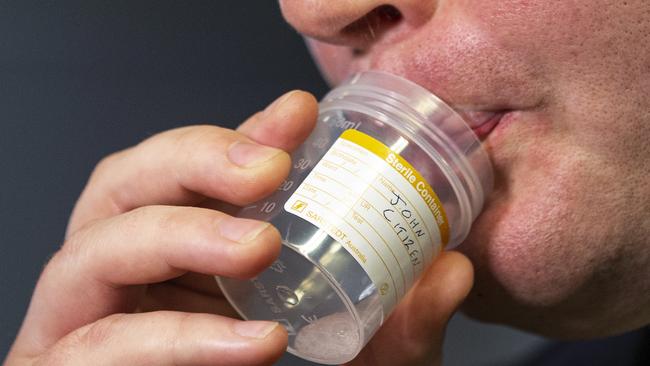
Doherty Institute Director Sharon Lewin said the test had first been validated on 600 specimens collected at the Royal Melbourne Hospital, “and actually performed well, but not as well as the throat swab.”
“It has a sensitivity of around 87 per cent,” Professor Lewin said.
“The advantage of the saliva test of course is that it’s much more acceptable for people to give the specimen. People just need to collect saliva in their mouth for a minute or two and then spit it into a small jar, and then that small jar gets sent off to a laboratory, and the standard test is again performed to detect COVID-19.
“We think it will play a role in bolstering testing reach across the state, particularly, as you heard earlier, in vulnerable populations or people who have trouble with the throat swab, such as children or other individuals who find it more acceptable.
“The gold standard is of course a throat swab, but we do believe that this certainly plays a role.
“Much better to have this done than to have no test at all, and we’ll be working with the department in comparing it to throat swabs, as well as testing it in these other populations.”
Chief Health Officer Brett Sutton welcomed the test’s “pilot phase” and said he hoped it would have an ongoing place in Victoria’s testing regime.
READ MORE: US tops 2.5m as COVID cases surge
Rachel Baxendale 2.10pm: Two family clusters now linked in outbreak
Victorian Health Minister Jenny Mikakos said on Monday a link had been established between a cluster dubbed the North Melbourne family outbreak, and another being referred to as the Brimbank family outbreak.
As of Sunday, there were 21 cases in the North Melbourne cluster and six in the Brimbank cluster.
“There is now a link that’s been established between the North Melbourne family outbreak, and the Brimbank family outbreak, so four of the new cases have been linked to this outbreak, and the department is investigating the exact nature of the link there,” Ms Mikakos said.
The North Melbourne family outbreak includes several cases detected in staff members at the H&M clothing store at Northland, in Melbourne’s northern suburbs.
Two of the affected staff members attended the Black Lives Matter protest in Melbourne’s CBD on June 6, less than a fortnight before testing positive to COVID-19.
However, Chief Health Officer Brett Sutton has said he believes the protest was not the source of the cluster.
Another three of Victoria’s new cases on Monday are in security contractors from the Stamford Plaza quarantine hotel, who tested positive on Day 11 of their 14 day quarantine period.

There have now been 23 cases linked to Stamford Plaza security staff, which combined with 17 earlier cases in security staff at the Rydges on Swanston quarantine hotel and their close contacts, means there have now been 40 cases linked to quarantine hotel breaches.
Another of Monday’s cases has been linked to a family outbreak in Wollert, on Melbourne’s northern outskirts, bringing the total in that cluster to 10.
There have also been several new family clusters declared.
These include a family in Patterson Lakes and Lysterfield, in Melbourne’s outer southeast, with three new cases on Monday bringing the total in the cluster to four.
Three new cases have also been linked to a family outbreak in Truganina, in Melbourne’s outer west, bringing the total number of cases in that outbreak to five.
Victoria’s second wave of COVID-19 infections is fortunately coinciding with school holidays, with six new schools linked to new cases on Monday.
The schools are Queen of Peace Parish Primary School in Altona, in Melbourne’s southwest, Aitken Hill Primary in Craigieburn in the outer north, Maribyrnong College and Footscray High School in the west, Port Phillip Special School in the inner south, and Al-Taqwa College Truganina in the outer west.
Guardian Childcare Abbotsford in the inner northeast has also been closed for cleaning until Wednesday, following a positive case in a child.
A healthcare worker has tested positive at the Melbourne Clinic mental health clinic in Richmond, with close contacts among patients and staff being identified and contacted.
Another case has been detected in a staff member at the Red Cross’s blood donation processing facility, known as Lifeblood Red Cross.
Health Minister Jenny Mikakos said details of many of the cases had come through very late on Sunday evening, and authorities would confirm any further links to known outbreaks or vulnerable settings as the information became available.
READ MORE : Early super payments pass $17bn
Agencies 2.05pm: Queensland justified to keep borders closed: AMA
Queensland would be justified in keeping its border closed for another week, if not two, because of a second COVID-19 wave sweeping Victoria, says the country’s peak doctors group.
Australian Medical Association’s Dr Chris Moy says he’s not advocating the Sunshine State remain closed but there are genuine concerns about the outbreak in Victoria which has had more than 150 cases in the past three days.

Queensland Premier Annastacia Palaszczuk will announce on Tuesday when the next easing of restrictions will be triggered and possibly when the borders, which have been closed since March, will reopen.
The state has just two active cases and recorded just one positive test in the past week. — AAP
READ MORE: ADF on COVID war footing
Rachel Baxendale 2.05pm: Victorian’s damning spike figures
The 75 new COVID-19 cases in Victoria today represent the worst daily case count in the state since late March.
There have only been three days of the pandemic with higher tallies.
They were March 28, when there were 111 new cases, March 29 with 84, and March 31 with 96.
READ MORE: State’s COVID-19 failure
Max Maddison 1.55pm: ‘No firm commitment’ to reopen SA borders
South Australian Police Commissioner Grant Stevens says border restrictions will be relaxed, to a pre-approval process, but says there’s “no firm commitment” to reopen the borders on July 20.
Speaking at a press conference, Mr Stevens said while everyone would be required to log their details before travelling to SA, for travellers from jurisdictions with border restrictions —- Victoria, NSW and the ACT — a traveller will either be deemed an “essential traveller” or directed to undergo quarantine.

Less stringent information will be required from “COVID safe zones” — such as the Northern Territory, Queensland WA or Tasmania – to ensure they haven’t returned from overseas within the past fourteen days.
Despite setting July 20 as the date to remove all restrictions, Mr Stevens said “there was no firm commitment” to that date if the circumstances in Victoria continued to pose a threat to SA residents.
READ MORE: ‘Get a grip, America’
Patrick Commins 1.45pm: Australian shoppers get back out there
Australians are increasingly comfortable getting back out and about, with three in four shopping in physical stores, and a similar proportion saying they either had or intended to spend more eating out at cafes and restaurants.
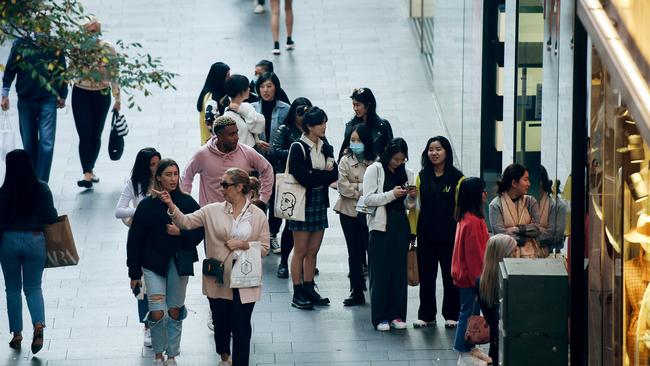
The easing of social distancing restrictions since mid-May has allowed establishments to allow a growing number of customers to dine in and shop, and the latest report from the Australian Bureau of Statistics suggests people have taken up the opportunity to go out with some gusto.
More than three quarters of people also said they had, or intended to, use public recreational areas, including beaches, parks and playgrounds.
The household impacts of COVID-19 survey was conducted over the week to mid-June, and so predate the recent spike in virus cases in Melbourne.
READ FULL STORY here.
Emily Ritchie 1.20pm: Telehealth ‘sustainable legacy’ of pandemic: Hunt
Health Minister Greg Hunt says the telehealth network should be a complement to, rather than a replacement of, face-to-face healthcare and that the government is working closely with stakeholders to ensure the telehealth model is a sustainable legacy of COVID-19.
Speaking with economic think tank CEDA on Monday, Minister Hunt said the health system had accommodated 17 million telehealth consultations since the coronavirus pandemic first emerged.
“We’ve got a system that we intend to be a long-term system,” Minister Hunt said.
“We’ll have to adjust it to make sure it’s not … subject to overuse by some sectors as occurred with the after-hours in home a while ago. But (we’re) all committed to that project. The goal is to make telehealth an abiding legacy. It was an emergency change but with a permanent implication for Australia.”
Minister Hunt said the telehealth system, which will be covered by Medicare until September 30, has been predicted to produce “at least $300 million” of economic benefits per year in terms of efficiencies, as well as patient benefits.
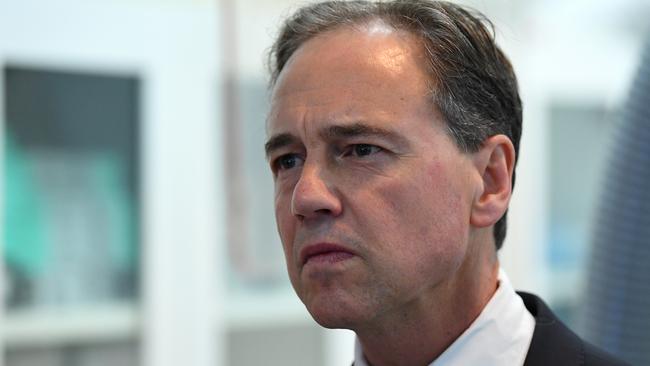
“Part of that has been the transformation of the mental health system, where many people are actually maintaining a much higher rate of attendance through online consultations than would have otherwise been the case.”
Minister Hunt said there were three categories of people most likely to be impacted by mental health at this time: those who are concerned about their health, those affected by isolation and lockdown and those who have been impacted economically through job losses, business closures, mortgages and rents.
Minister Hunt said there were now almost 6.5 million Australians who had downloaded the COVIDSafe app and argued it “does work”, having been effectively used in contact tracing for outbreak clusters.
“It has been used in those states that have had cases, in Victoria significantly and in NSW,” Minister Hunt said.
“It has identified contacts but also identified people who have not been identified through contact tracing, so it actually works. But thankfully we’ve had very few cases and effectively zero community transmission in most states and territories.”
Minister Hunt said the National Cabinet was working to create a national standard for the ethical approval of clinical trials in order to generate investment in research in Australia beyond the pandemic.
He said Medicines Australia had asked the government to create a “one-stop-shop” for clinical trial approvals.
“If we can have one university’s ethics approval recognised around the country, if there’s a standard and institutions are included, then that will expedite that investment process and the pharmaceutical companies have said that will bring up more general investment in basic research as well as potential for advanced manufacturing in Australia.”
READ MORE: Call to keep telehealth
Max Maddison 1.10pm: ‘Day by day’: AFL reacts to Queensland travel ban
AFL chief executive Gillon McLachlan says the code will need to be “flexible and agile”, after the Queensland government imposed a fourteen day quarantine for any Melbourne teams entering the state.
However, Mr McLachlan said he didn’t believe any teams would be required to be forced into taking weeks off, reiterating that the competition would take things “day by day”.

We’ll also said at the start of this season that it would be a season like no other. We’re going to have to be flexible and agile throughout this season in order to play all 144 games, in the season, plus finals,” Mr McLachlan told a press conference.
“That’s why we changed the length of quarters and reduced the length of the season. In football people love predictability, order, routine. This is a season where predictability, order has been, and will continue to be, difficult.”
However, he did concede the Gold Coast Suns might not be able to return to Queensland.
“The Suns will have to do that and we’re working through how that will be and they might not go back to Queensland,” he said.
“That clearly will be adhered to and we’ll advise on that in the coming days about how they traverse back to Queensland. Whether they did go back into quarantine or went a different way.”
READ MORE: AFL schedule in chaos amid virus spike
Sarah Elks 1pm: Queensland puts restrictions on football travel
Queensland’s Chief Health Officer has introduced strict new quarantine rules for Queensland football teams that come into contact with Melbourne-based teams, signalling the state’s concern about the Victorian outbreak.
Queensland Premier Annastacia Palaszczuk is due to make an announcement on Tuesday about whether the state’s border will reopen on July 10 as planned, based on health advice from CHO Dr Jeannette Young.
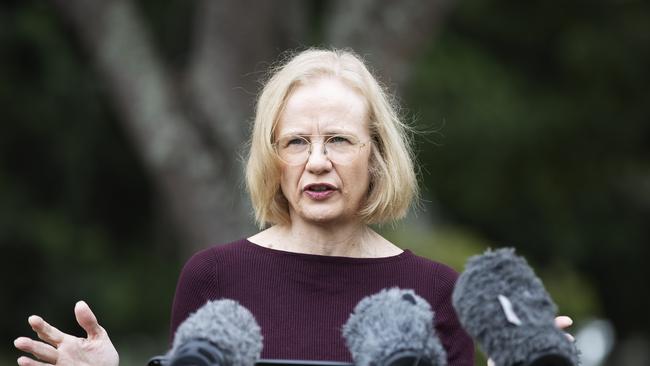
Dr Young has given a clear indication about her concerns about the Victorian outbreak, with the new rules for football teams.
“The new measures specifically impact all Queensland-based teams, regardless of the code, and their interactions with Victorian-based teams,” Dr Young said.
“These new measures do not prevent Victorian AFL teams travelling to QLD for existing matches. The new arrangements do however place extra restrictions on Queensland-based teams who play teams who have been in hot spots.”
The rules are:
* Any Queensland or Queensland-based team who plays against a Melbourne team in Queensland is required to quarantine after the match for 14 days; or
* plays in Melbourne is required to quarantine for 14 days on returning to Queensland, or
* plays in another state against a team who has been in Melbourne in the preceding 14 days is required to quarantine on their return to Queensland.
Dr Young said they were temporary measures to protect Queenslanders from the “sustained” community transmission in Victoria.
Queensland recorded zero new cases of COVID-19 overnight and has just two active cases.
READ MORE: Australians get back out there
Debbie Schipp 12.50pm: AFL games postponed, fixture up-ended amid spike
This week’s West Coast vs Richmond clash at Metricon Stadium has been postponed because of Victoria’s deepening coronavirus situation.
The Tigers were due to meet the Eagles on the Gold Coast on Thursday night, but Queensland border closures have forced a radical revamp of the Round 5 fixture.
It is the second game delayed since this month’s season restart. Last weekend’s Essendon vs Melbourne clash was put off until later in the season after Bombers defender Conor McKenna tested positive to COVID-19.
The AFL has moved quickly this morning to alter the fixture and reschedule its Round 5 games to keep the season rolling.
READ MORE: AFL schedule in chaos amid virus spike
Max Maddison 12.45pm: Millennials blamed for Melbourne outbreak
Millennials have been blamed for resurgence of coronavirus cases in Melbourne, as health authorities grapple a second wave of infections.
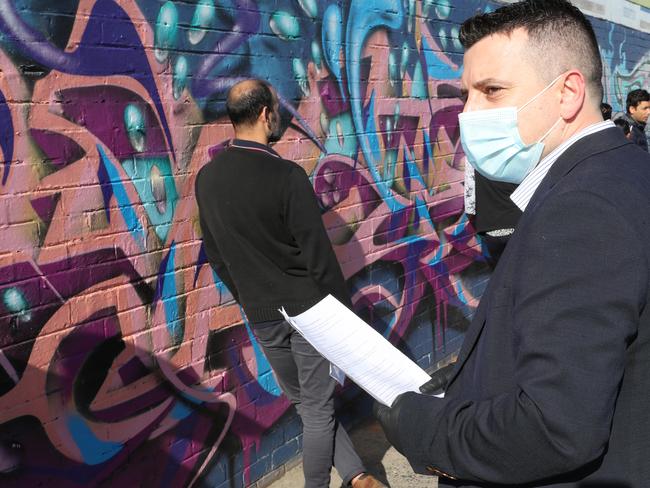
With people younger than 40 representing a third of the state’s second uptick in cases, Victoria’s Chief Health Officer Brett Sutton said it was likely Millennials showing mild symptoms were spreading the virus.
“No one wants to be in the position where you’re killing a family member because you’re not looking after yourself in terms of the risk of transmission,” Professor Sutton said.
“It is reflected in the numbers that young people are infected more now, they’re making up a greater proportion.”
Victorian Health Minister Jenny Mikakos also pointed the finger at younger people
“We don’t want people to be complying because they’re fearful of getting a fine, we want people to comply because they want to drive down the numbers,” Ms Mikakos said.
“We will take whatever steps are necessary in the interest of public health.”
READ MORE: Why is COVID-19 testing not compulsory?
Max Maddison 12.30pm: SA eases restrictions, relaxes social distancing
South Australia will see coronavirus restrictions ease today, as the economy takes another step towards normality.
Venues will receive a major boost, as relaxed social distancing restrictions double their allowed capacity. The restriction requiring one person for four square metres has been eased to one person per two square metres.
Dancefloors across the state will see revellers flock back, with nightclubs allowed to reopen, while casinos and gaming rooms will resume trading. Food courts have also been given the all clear to recommence operations.
Spas and saunas will also reopen.
READ MORE: AFL clash postponed over virus spike
Rachel Baxendale 12.15pm: Victorian CHO all but concedes ‘second wave’
Victorian Chief Health Officer Brett Sutton all but conceded the state was grappling with a second wave of infections.
“Whatever you call it, it’s as big as the first one, it’s looking that way,” Professor Sutton said. “Second peak, second wave, it’s got the same challenges.
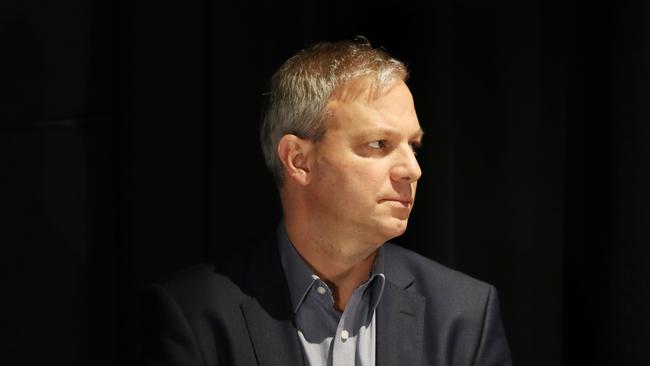
“We’ve got significant numbers to follow up, and we’ve got significant risk of transmission from all of those newly diagnosed cases.”
Victoria has now conducted more than 792,000 COVID-19 tests since the pandemic began, compared with 842,374 in NSW.
Allowing for population differences Victoria’s testing rate is now better than NSW’s with 12,611 tests per 100,000 people, compared with 10,540 in NSW.
Victoria’s testing figures include 53,000 tests conducted since it began a testing blitz in hotspot suburbs late last week.
“Obviously we are analysing those testing results, and we’ll have more to share with you, hopefully tomorrow, but what I can say is that of many of the cases that have come through today, they are overwhelmingly concentrated in those priority suburbs,” Health Minister Jenny Mikakos said.
“We’ve got many cases across the inner northern suburbs and the western suburbs of Melbourne, but not exclusively, and it’s important to reiterate to the community that you’re not immune from catching coronavirus by virtue of the postcode that you live in that the risk is throughout the state of Victoria and we want people to remain vigilant about this pandemic.”
READ MORE: Refuse a quarantine test? Not on your life
Max Maddison 11.30am: NSW records 7 cases, all returned travellers
NSW has recorded another day without community transmission, despite another mammoth day of testing.
As at 8pm Sunday 28 June, 7 new cases of COVID-19 have been diagnosed, bringing the total number of cases in NSW to 3,184.
— NSW Health (@NSWHealth) June 29, 2020
All new cases are returned travellers in hotel quarantine. pic.twitter.com/dkYHK5ExLF
In a statement, NSW Health said the seven reported cases of coronavirus were all from returned travellers in hotel quarantine. The recorded cases brought the state’s total to 3,184.
In the past 24 hours, health authorities undertook 11,833 tests, compared to 18,114 tests the day beforehand. NSW has carried out more than 842,000 COVID-19 tests.
There are currently 53 active cases being treated by NSW Health – none in intensive care.
READ MORE: Busy week for auctions despite surge
Rachel Baxendale 11.20am: New Victoria cases soar to 75
Victoria has confirmed 75 new cases of coronavirus in the past 24 hours. The massive increase comes after more than 80 new cases were confirmed over the weekend.
Victoria has now had 2099 cases of COVID-19 since the pandemic began.
The reclassification of four cases means there has been a net increase of 71 cases since Sunday.

Just one of Monday’s new cases is in a patient in hotel quarantine, while 14 have been linked to known outbreaks.
There are 37 cases in Monday’s results which were detected through routine testing, while the remainder are under investigation. There have been six more cases from unknown sources added to Victoria’s community transmissions tally, which now stands at 271.
There are currently 288 active cases of COVID-19 in Victoria.
Nine Victorians are in hospital with COVID-19, including one in intensive care.
READ MORE: How Victoria got it so wrong on COVID-19
Max Maddison 11.10am: ‘Best form of welfare is a job’
The “best form of welfare is a job”, says Deputy Prime Minister Michael McCormack, as the debate rages over calls to increase Newstart welfare payments.
Hours after Nationals MP Barnaby Joyce said going back to $40 a day “won’t work”, Mr McCormack said the federal government was “continually reviewing” welfare payments, but wouldn’t commit to an increase once the Job Keeper program finished in September.
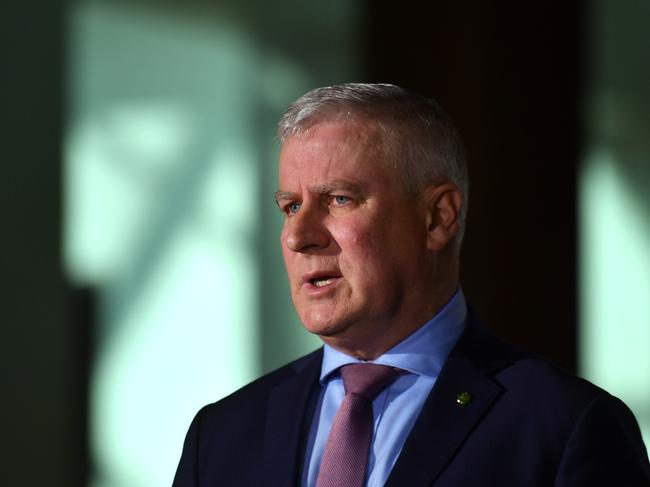
“Jobseeker and Newstart was only ever a stop gap. The best form of welfare is a job and that’s why as a government, and in our first term, we helped small business create 1.5 million jobs and we wanted to double that,” Mr McCormack said at a press conference.
However, the National Party leader conceded Australia wasn’t “out of the woods both healthwise and economically”.
“We’re looking at measures, we are talking to people. Young people, older people, business people, people who have lost jobs, people who are on welfare for the first time in their lives,” Mr McCormack said at a press conference.
“It is tough, I don’t deny that it is very, very tough for some people who have lost their jobs, who have had jobs all their lives and suddenly find themselves on the welfare queue,” he said.
READ MORE: ‘Extend amnesty on super’
Max Maddison 10.35am: ‘No health reason’ to keep borders closed
Despite a resurgence of infections across Melbourne, Small and Family Business Minister Michaelia Cash maintains there’s “no health reason” for why state borders should remain closed.
Ms Cash reiterated that the Victorian outbreak was in line with the federal government’s suppression, rather than eradication, COVID-19 strategy.
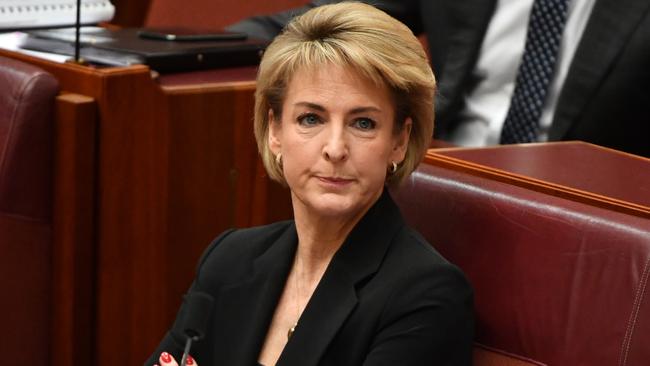
“Absolutely devastating what’s going on in Victoria. What we have done is ensure that our
hospitals and our ICUs in particular have the capacity, and they now have that capacity, so there is no health reason as to why borders should remain closed,” Ms Cash told Seven’s The Morning Show.
“What we do need to see now is those restrictions easing and Australians being able to travel across borders and in the event that if there is a breakout, we have the policies in place to jump on it as quickly as possible and contain it. That is what we need to do effectively as a country.”
However, despite an economic cliff looming in September with the end of JobKeeper, Ms Cash reassured voters that there is a “light at the end of the tunnel”.
“And I can assure you, as Cabinet ministers, we are working day and night to ensure that there is that light at the end of the tunnel. The Prime Minister reminds us almost on a daily basis, never ever forget you are dealing with people’s lives and their jobs, and that is at the forefront of our minds,” she said.
READ MORE: Melbourne spike ‘not a second wave’
Richard Ferguson 10.15am: Permanent JobSeeker could hinder recovery: PM
Scott Morrison warns a permanently high JobSeeker welfare benefit could hinder the economic recovery, as calls intensify to keep the dole above pre-coronavirus levels.
JobSeeker is set to reduce from $1100 a fortnight in September, but it is not clear if it will go back to the pre-pandemic level of $550.
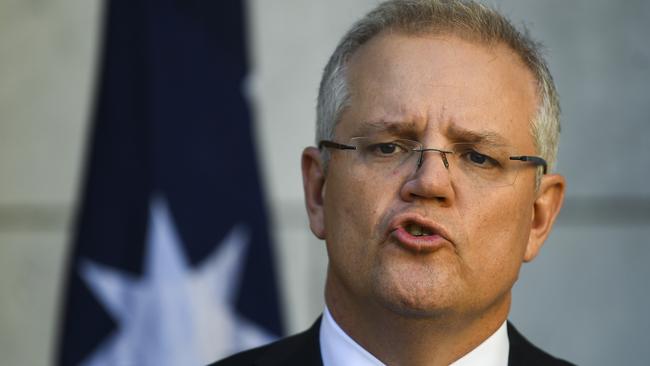
The Prime Minister on Monday said that abnormally high welfare payments were making it more difficult for recovering businesses to fill shifts.
“What we have to be worried about now is that we can’t allow the JobSeeker payment to become an impediment to people getting out and doing work, and getting extra shifts,” he told 2GB radio.
“We are getting a lot of anecdotal feedback from small businesses, and even large businesses, where some of them are finding it hard to get people to come and take the shifts because they’re on these higher levels of payment.
“We’ve got to make sure that we continue to provide what is a reasonable level of support during the worst recession we’ve had since the Great Depression.
“But at the same time, we can’t let the help get in the way.”
READ MORE: ‘Reform to offset slump’ in mine jobs
Max Maddison 9.40am: Pre-JobSeeker welfare payments ‘didn’t cut it’
Welfare payments before JobSeeker didn’t “cut it”, says Nationals MP Barnaby Joyce, and putting them back to $40 a day “won’t work”.
Mr Joyce said he hadn’t heard about proposals to increase the payments by $75 a week, but reiterated his support for an increase in welfare payments.

“I have argued for a long time that $280 a week does not cut it. There will have to be some form of increase. I doubt it will go to $75 a week but somewhere in between where we are and that point is where we will land,” Mr Joyce told Seven’s Sunrise.
“$280 a week does not cut it. I think it will be something like $300 a week. I can’t see them putting it back to where it is, it won’t work. There are many more people that want a job and that is the thing to remember. They are not lazy, they want a job and don’t have a job.”
The member for New England also said the “biggest problem” Australia had with COVID-19 wasn’t the unused COVIDSafe app, but the Black Lives Matter protests.
“The biggest problem we have had with COVID-19 is the Black lives matter demonstrations. People got together. And that shows the whole of Australia that it is important,” he said.
“Even in my own logic and approach I started to become relaxed because if I thought a thousand people can walk down the street together, why am I worried about being close to one person? I will change back to how we work, and so should everybody else.’”
READ MORE: Young may feel pain long after recovery
Max Maddison 9.20am: Melbourne airport ABF worker positive
A worker at the Australian Border Force base at Melbourne Airport has tested positive for coronavirus, with the ABF offices undergoing a deep clean.
Staff at Customs House at Tullamarine were notified on Sunday after the cleaning contractor returned a positive test.
#BREAKING: A worker at the Australian Border Force base at Melbourne Airport has tested positive to the coronavirus. #9News pic.twitter.com/HhBQ47LLRH
— Nine News Australia (@9NewsAUS) June 28, 2020
In a statement, The Department of Home Affairs described the measures as a “precautionary clean”.
“The safety and wellbeing of our officers remains a key priority in protecting our borders,” the Department said.
A staff member who works at Customs House said the site would remain open, the Herald Sun reports.
In an official statement the ABF said the Department was advised on Sunday by its Property Service Provider (JLL) that a staff member of one of their cleaning subcontractors tested positive to COVID-19 on Saturday 27 June.
It said a precautionary clean is scheduled to be undertaken on Monday.
“The Department will follow all directions provided by Victorian Health. The safety and wellbeing of our officers remains a key priority in protecting our borders. For privacy reasons, it would be inappropriate to comment further.” the statement said.
READ MORE: Containing mini-spike is vital
Max Maddison 9.05am: JobSeeker rise ‘ultimately comes from taxpayer’
Increasing Job Seeker payments is just “one of many balls in the air”, but the funding for any increase will have to “come from somewhere”, says Liberal MP Dave Sharma.
Mr Sharma was noncommittal when pressed on whether he would support calls to increase Job Seeker payments by $75 per week.
“This is one of many balls that are in the air. It doesn’t seem to make much sense to seize upon a particular vertical and say we need to do this with this,” Mr Sharma told Sky News.
“I’m always interested in seeing what the case is for more government support for any sector. But I think the important thing to note here is that the money has to come from somewhere, and ultimately it comes from taxpayers.”
The Morrison government says it needs time to assess changes to its subsidy schemes before it can announce any new support system.https://t.co/fTG8ruueP2
— Sky News Australia (@SkyNewsAust) June 28, 2020
Mr Sharma said the eventual state of the economy would ultimately depend on the ability to open up to the rest of the globe, but warned current levels of fiscal support were “unsustainable”.
“The unfortunate truth is that this is a massive hit to the economy. We are not going to come out this unscathed, jobs are not going to come out of this unscathed and businesses are not going to come out of this unscathed,” he said.
“Ideally, we want as many people off welfare and off government benefits back into the workforce and back into jobs, but how much we can get that happening again will depend in large part on our contact with the outside world.”
READ MORE: No plan for permanent boost to dole
Max Maddison 8.20am: Coatsworth: tracking app not yet needed
The federal government’s COVIDSafe app hasn’t been a waste of money, says Deputy Chief Medical Officer Nick Coatsworth, despite the platform having not been used by health authorities to identify close contacts of people infected with coronavirus.

Dr Coatsworth said the traditional forms of contact tracing meant the app hadn’t been required so far.
“The reality is contact traces are so good at the moment that the initial phone conversation with the affected patients of COVID-19, they are picking up most of the contacts,” Dr Coatsworth told Seven’s Sunrise.
“There is about on average 10 contacts per person and they are picking up the same contacts as the app, so that means they are doing a great job.”
Dr Coatsworth also said the new saliva test was “slightly less accurate” than the current nose and throat swabs.
“I have had the nose and throat swab and while it is uncomfortable for about 10 seconds, it is not that bad. It is still the preferred way of getting a specimen but it is something that if you really don’t want to do, a saliva test is an option,” he said.
READ MORE: Refuse a COVID test? Not on your life
Max Maddison 7.35am: Virus blown completely out of proportion: Hanson
COVID-19 has “been blown completely out of proportion”, says Pauline Hanson, despite a resurgence of cases in Victoria and global confirmed cases exceeding 10m.
"I think that this COVID-19 has been blown completely out of proportion." @PaulineHansonOz on the current escalation of coronavirus cases in Victoria and the border closures. #9Today pic.twitter.com/PHXhLP3INk
— The Today Show (@TheTodayShow) June 28, 2020
Ms Hanson said she was “so over this COVID”, as she implored people to move on with their lives.
“But as far as I’m concerned I think that this COVID-19 has been blown completely out of proportion. People that die in a car accident and have COVID are considered to have died because of COVID,” Senator Hanson told Today on Nine.
“They will let us know when she thinks it’s right to open up the borders. Forget about the businesses being lost, jobs being lost, the COVID I think has been a real scare monger on the people.”
Pointing to the “103 or 104 deaths”, the Queensland Senator said the debt burden would outweigh the health impact for years to come.
“The rest of the world has had a lot, but a lot of the people had health issues. Those people had health issues. Those people with health issues, if you are in that age bracket, you have a condition or you are in nursing homes go and lock yourself away,” she said.
READ MORE: Now to flatten the mental health curve
David Rogers 7.20am: ASX poised to open firmly lower
The ASX is tipped to open firmly lower after Friday’s falls on Wall Street, where the Dow lost 2.8 per cent, the S&P 500 shed 2.4 per cent and the Nasdaq fell 2.6 per cent amid a surge in coronavirus cases in the US.
READ Trading Day live blog here
Max Maddison 6.45am: Cases still spiking across Americas
The US saw its largest daily increase in confirmed cases over the weekend, with 45,255 followed by 42,597 recorded infections in the past 24 hours. In total, the country has reported 2,510,151 cases, and 125,539 deaths.
India also posted a record daily increase of confirmed cases, despite Prime Minister Narendra Modi continuing to ease restrictions across the nation. The country exceeded half a million cases on Sunday.
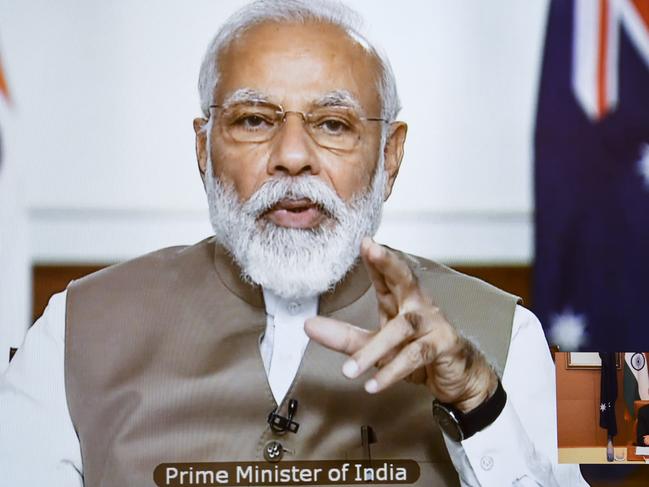
The spread of coronavirus shows little sign of relenting across the Americas.
Cases in Brazil also continued to soar, with 38,693 cases reported yesterday taking the country’s total confirmed cases to 1,313,667 cases, and 57,070 deaths. With another 3,849 cases recorded yesterday, Colombia has seen recorded infections spike in June, with the country’s total number of confirmed cases likely to tip 100,000 by the end of the week.
While Mexico is consistently reporting over 5,000 infections per day – a figure which is likely to understate the true number due to a chronic lack of testing kits. The country has reported 1,313,667 cases, and 57,070 deaths.
READ MORE: US tops 2.5m as cases surge
Agencies 6.10am: Global cases pass 10 million with 500,000 deaths
Global coronavirus cases have passed 10 million, and deaths approached half a million, while cases continue to rise in the US.
The US recorded more than 42,000 cases on Saturday, according to data compiled by Johns Hopkins University, the second straight daily total over 40,000.

Florida, Texas, California and Arizona have imposed new restrictions after cases surged in those states.
The Trump campaign postponed events at which Vice President Mike Pence was to appear on Tuesday in Tucson, Arizona., and Thursday in Sarasota, Florida. But Mr Pence urged supporters in Dallas to wear masks in public.
READ MORE: Basement campaign works for Biden as Trump rages above
Rebecca Urban 5.05am: Victoria may reimpose stay-at-home orders in hot spots
Victorian Premier Daniel Andrews has announced a toughening of the state’s quarantine regime, with stay-at-home orders potentially to be reimposed on virus hot spots if health advice determined they were necessary.
Victoria reported 49 new coronavirus cases on Sunday and 41 on Saturday — the highest number of cases in the past 12 weeks.

More than 40,000 tests were carried out at the weekend at pop-up clinics and mobile testing booths, while health workers also went door to door offering testing.
Latest traffic data has revealed that residents of two major virus hot spots — the municipalities of Hume and Casey on Melbourne’s outer fringe — have been particularly mobile since the start of June.

Read the full story here.
Mirko Bagaric 5am: How Daniel Andrews got it wrong on COVID-19
Illegitimate criminal laws are an ineffective means of achieving social control. That is why it is no surprise that Victoria — which issued almost three times the number of COVID-19 fines as any other state and had the strictest lockdown laws in the country — finds itself reimposing restrictions following a dramatic spike in coronavirus cases, writes Mirko Bagaric in today’s The Australian.
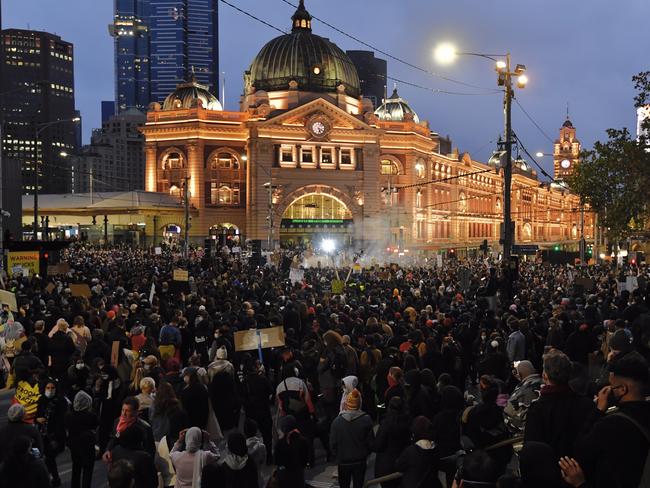
“The pandemic is principally a community health problem, not a criminal justice issue. The failure of the Victorian government to realise this and its overzealous insistence on arbitrary restrictions including prohibiting fishing and golf (even solo) resulted in people questioning many of the lockdown laws, even those that were appropriate,” Bagaric says.
“Criminological research has demonstrated that if we see laws as lacking credibility we are less likely to comply with them. This was noted by microbiologist Peter Collignon when discussing the Victorian coronavirus outbreak. He said that ‘Victoria went too far’ and ‘if you overdo it, you find people rebelling’.”
Read the full story here.
Agencies 4.45am: Race for COVID-19 vaccine enters crucial stage
People on six continents already are getting jabs in the arm as the race for a COVID-19 vaccine enters a defining summer, with even bigger studies poised to prove if any shot really works — and maybe offer a reality check.
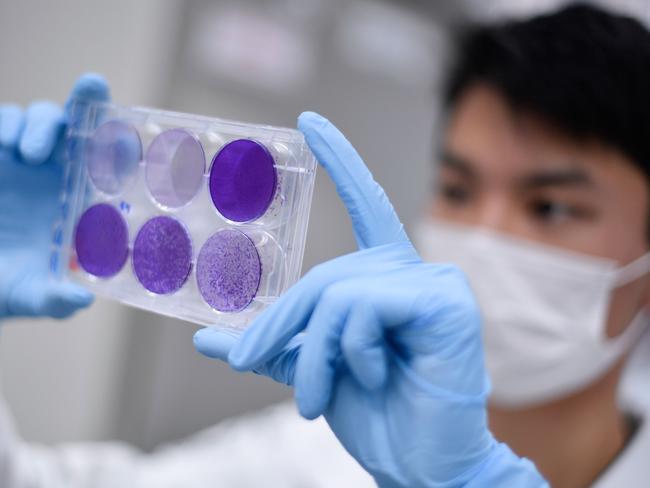
Already British and Chinese researchers are chasing the coronavirus beyond their borders, testing potential vaccines in Brazil and the United Arab Emirates because there are too few new infections at home to get clear answers. The US is set to open the largest trials — 30,000 people to test a government-created shot starting in July, followed about a month later with another 30,000 expected to test a British one.
Those likely will be divided among Americans and volunteers in other countries such as Brazil or South Africa, Dr Anthony Fauci of the National Institutes of Health said.
While he’s optimistic, “we’ve been burned before,” Fauci cautioned. Multiple successes, in multiple parts of the world, are vital. “This isn’t a race of who gets there first. This is, get as many approved, safe and effective vaccines as you possibly can.”
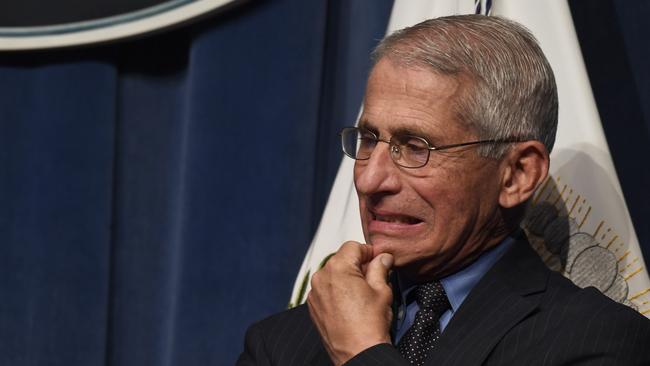
READ MORE: US tops 2.5 million coronavirus cases




To join the conversation, please log in. Don't have an account? Register
Join the conversation, you are commenting as Logout